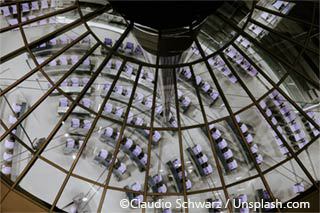"Dare more progress – Alliance for Freedom, Justice and Sustainability" is the name of the still new coalition agreement between the SPD, Bündnis 90/Die Grünen and the FDP. It should go forward, "progress" is the buzzword. But can the treaty keep what the snappy headline promises? What does it mean in particular for economic policy and for the economy battered by Corona? In the current issue of the "Kölner Impulse zur Wirtschaftspolitik", six scientists from the Institute for Economic Policy (IWP) at the University of Cologne, affiliated institute of the WiSo Faculty, address these questions. With comprehensive expertise, Ann-Kristin Becker, Michael Krause, Theresa Markefke, Felix Mindl, Christoph Oslislo & Steffen Roth highlight the coalition agreement.
For example, the business experts shed light in detail on the chapters "Climate protection in a social-ecological market economy" and "Lead market for electromobility". Exciting detail: The word "climate" appears 198 times in the 174-pagecontract. However, the apostrophised climate targets are largely in line with already agreed targets at EU level and old government targets. Guiding principles are still "decarbonisation [of the economy] to comply with the 1.5-degree path" and "climate neutrality by 2045 at the latest".
"Unfortunately, however, in many places the wording in this treaty does not go beyond vague – albeit sometimes ambitious – declarations of intent," the scientists conclude. An innovation, however, were the so-called "climate checks", a kind of examination that every new draft law must insist on compatibility with the climate protection goals.
For the transport sector, the treaty also sets ambitious targets, as greenhouse gas emissions in this area have not decreased under the previous government. The proposition: CO2-neutral vehicles only from 2035. A problem with this demand, for the WiSo researchers, is that it is neither to prevent end-of-life vehicles from continuing to be used nor that more combustion engines are bought shortly before the law comes into force. According to the will of the contractual partners, this effect is to be cushioned by a simultaneous expansion of e-mobility.
If the IWP scientists consider the leitmotifs to be quite sensible, in their opinion the explanations on the steps required for this remain vague for the time being. "Ambition alone is not enough [...], you also need realistic ideas for the implementation of the goals," they warn.
The IWP of the University of Cologne investigates current topics on economic policy. In the winter semester 2021/2022, for example, a lecture series on economic policy before, during and after the corona crisis will take place. The focus: Current issues, such as resilience in the healthcare system, German debt policy or climate protection.
The authors:
